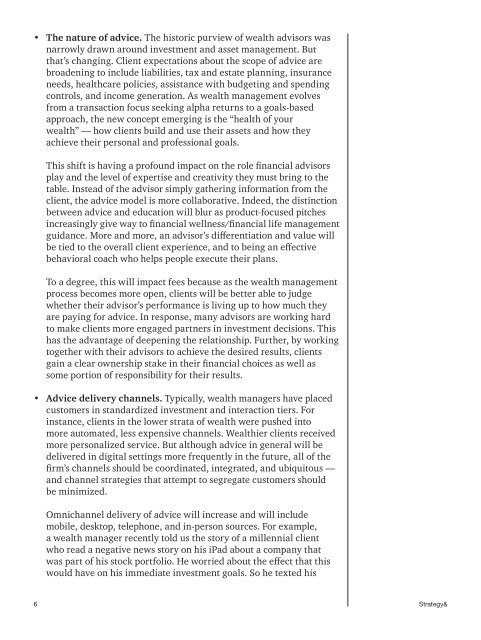2016 wealth management trends A revolution both loud and quiet
2016-Wealth-Management-Trends
2016-Wealth-Management-Trends
You also want an ePaper? Increase the reach of your titles
YUMPU automatically turns print PDFs into web optimized ePapers that Google loves.
• The nature of advice. The historic purview of <strong>wealth</strong> advisors was<br />
narrowly drawn around investment <strong>and</strong> asset <strong>management</strong>. But<br />
that’s changing. Client expectations about the scope of advice are<br />
broadening to include liabilities, tax <strong>and</strong> estate planning, insurance<br />
needs, healthcare policies, assistance with budgeting <strong>and</strong> spending<br />
controls, <strong>and</strong> income generation. As <strong>wealth</strong> <strong>management</strong> evolves<br />
from a transaction focus seeking alpha returns to a goals-based<br />
approach, the new concept emerging is the “health of your<br />
<strong>wealth</strong>” — how clients build <strong>and</strong> use their assets <strong>and</strong> how they<br />
achieve their personal <strong>and</strong> professional goals.<br />
This shift is having a profound impact on the role financial advisors<br />
play <strong>and</strong> the level of expertise <strong>and</strong> creativity they must bring to the<br />
table. Instead of the advisor simply gathering information from the<br />
client, the advice model is more collaborative. Indeed, the distinction<br />
between advice <strong>and</strong> education will blur as product-focused pitches<br />
increasingly give way to financial wellness/financial life <strong>management</strong><br />
guidance. More <strong>and</strong> more, an advisor’s differentiation <strong>and</strong> value will<br />
be tied to the overall client experience, <strong>and</strong> to being an effective<br />
behavioral coach who helps people execute their plans.<br />
To a degree, this will impact fees because as the <strong>wealth</strong> <strong>management</strong><br />
process becomes more open, clients will be better able to judge<br />
whether their advisor’s performance is living up to how much they<br />
are paying for advice. In response, many advisors are working hard<br />
to make clients more engaged partners in investment decisions. This<br />
has the advantage of deepening the relationship. Further, by working<br />
together with their advisors to achieve the desired results, clients<br />
gain a clear ownership stake in their financial choices as well as<br />
some portion of responsibility for their results.<br />
• Advice delivery channels. Typically, <strong>wealth</strong> managers have placed<br />
customers in st<strong>and</strong>ardized investment <strong>and</strong> interaction tiers. For<br />
instance, clients in the lower strata of <strong>wealth</strong> were pushed into<br />
more automated, less expensive channels. Wealthier clients received<br />
more personalized service. But although advice in general will be<br />
delivered in digital settings more frequently in the future, all of the<br />
firm’s channels should be coordinated, integrated, <strong>and</strong> ubiquitous —<br />
<strong>and</strong> channel strategies that attempt to segregate customers should<br />
be minimized.<br />
Omnichannel delivery of advice will increase <strong>and</strong> will include<br />
mobile, desktop, telephone, <strong>and</strong> in-person sources. For example,<br />
a <strong>wealth</strong> manager recently told us the story of a millennial client<br />
who read a negative news story on his iPad about a company that<br />
was part of his stock portfolio. He worried about the effect that this<br />
would have on his immediate investment goals. So he texted his<br />
6 Strategy&


